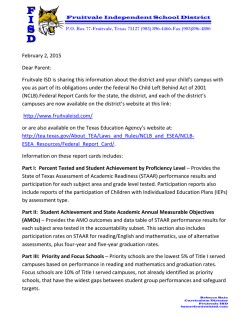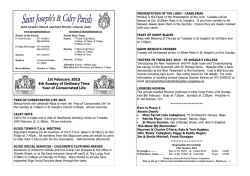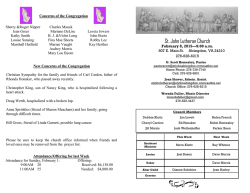
PRELIMINARY PROGRAM – UPDATED March 21
1 PRELIMINARY PROGRAM – UPDATED March 21 XXII Graduate Colloquium of Iberian and Latin American Languages and Cultures Department of Spanish and Portuguese The University of Texas at Austin March 2426, 2016 Thursday, March 24 6:00PM – Opening Keynote – Glenn Martinez GWB 2.206 Keynote Address “Negotiating Border Health: Language and Literacy Practices of Promotoras ” Glenn Martinez, Ohio State University Colonias are disproportionately Latino settlements close to the U.S.Mexico border characterized by extreme poverty, inadequate utility services, poor housing and lack of access to social services. Hundreds of colonias exist along the border. Within colonias, community health workers or promotoras have been shown to work effectively in creating a bridge between these marginalized communities and social service, public health and government agencies. Promotoras have been the focus of much of the colonia research; however, little is known about the linguistic and literacy practices in which they engage in order to effectively bridge these two culturally and linguistically encapsulated spaces. Focus groups with promotoras in the Cameron Park colonia of Cameron County, Texas were conducted. A discursive analysis of the focus group data revealed that promotoras engage in multiple language and literacy practices as they seek improvements on behalf of their communities. These practices are characterized by a transcompetence in which promotoras seamlessly weave their way through complex spaces and discourses in order to address problems identified by the community. This research has important implications for cultural and linguistic training of health professionals who interact with colonia residents. An understanding of the language and literacy practices in which promotoras engage and the underlying competencies that animate these practices can inform the development of more appropriate language and culture pedagogies for health professionals. Glenn Martinez is chair of the Department of Spanish and Portuguese, professor of Hispanic Linguistics, adjunct professor of Nursing, and member of the Cancer Control research group of the James Comprehensive Cancer Center at The Ohio State University. He is author of a dozen articles and book chapters on language access in health care, author of two books on Spanish in the United States, coprincipal investigator for the 2 Juntos: Integrated Second Language Learning for Chronic Care project funded by the National Institute for Diabetes, Digestive and Kidney Disorders, and project director for the Addressing Emerging Needs in Spanish and Portuguese funded by the U.S. Department of Education. He served as Chief Subject Matter Expert for the development of the Rosetta Stone/Kaiser Permanente Advanced Spanish for Healthcare Professionals project and has led other projects funded by the Fund for the Improvement of PostSecondary Education, the National Endowment for the Humanities, and the Humanities Without Walls Consortium funded by the Andrew F. Mellon Foundation. Friday, March 25 9:00AM TO 12:00PM Registration and Coffee CLA 1.302 A 9:00AM TO 10:00AM Panel 1 CLA 1.302 B Representing and Documenting the MexicoUS Border Moderator: Diana Norton Christopher D. Serna, University of California, Los Angeles The character of ‘La Juana’ as the nexus between Myth, History and Dramaturgy in Hugo Salcedo’s Arde el Desierto con los Vientos que Vienen del Sur Martin Meyer, Saint Louis University Permeabilidad de frontera entre Estados Unidos y México: Conexiones entre TLCAN, el narcotráfico y sus consecuencias en Traffic y Narco Cultura Sabino Luévano, Universidad de Houston, Texas El infierno de Luís Estrada: una reescritura de la mexicanidad 9:00AM TO 10:00AM Panel 2 CLA 1.302 D Narrating The Borderlands En Verso Y Prosa Moderator: Ricardo Aguilar Sarah Lowman, University of Georgia La identidad nahua: El pensamiento fronterizo por la expresión literaria y culinaria en Hoy le canto a mi sustento de Román Güemes, 3 Chelsey Smith, Syracuse University Resonancias en la frontera: The Iceworker Sings Ximena GonzalezParada, University of Georgia “Donde entierra Cayapa no entierra Juyungo ”: el papel del negro en la narración de la nueva historia del Ecuador Friday, March 25 10:00AM TO 11:30AM Panel 3 CLA 1.302 B Border Sounds Moderator: Dusty Hixenbaugh Esther Díaz Martín, The University of Texas at Austin Schizophonic Realism at the USMexico Borderlands: A Sound Study of Contemporary Corridos Enzo E. Vasquez Toral, Princeton University Catarina de Ataíde and her Demand for the Stage in Machado’s Drama Min Suk Kim, The University of Texas at Austin Los cuerpos latinoamericanos bailando al ritmo coreano: KPop flash mobs y “ShowMatch” en pantalla chica, Argentina (20112015) Cesar Silva Santisteban, Universidad Nacional Mayor de San Marcos Perú «Un reportaje en los infiernos. Apuntes sobre un podcast desde El Salvador» 10:00AM TO 11:00AM Panel 4 CLA 1.302 D Engajamentos e limites na literatura e lingüistica contemporanea Moderator: Yasmine BealeRivaya Lucas Gustavo do Nascimento Rigonato, The Catholic University of America, A experiência de um professor homossexual com o ensino crítico de línguas” Alexandre Ferreira Velho, Pontifícia Universidade Católica do Rio de Janeiro Literatura remediada: Morte e sobrevida 4 Friday, March 25 11:00am to 12:00pm – Panel 5 – CLA 1.302 D In the Borderlands of Language Moderator: Deborah Palmer Pablo Ceja Del Toro, CSU Fresno Old vs. New: Word Order Production of Noun Coordinate Structures by Adult Spanish Speakers and Bilingual Children of Spanish and English Yeni Dávila, The University of Texas at San Antonio La interpretación mediada en el ámbito educativo Berna Muñoz, Vanderbilt University Fonofagia en las hablas andaluzas Friday, March 25 12:00PM TO 1:00PM Panel 6 CLA 1.302 B Decentering Narratives of Empire and Conquest Moderator: Ignacio Carvajal, The University of Texas at Austin Chinamit? Pueblos?: Notions of Space, Organization, and Negotiation in the late Post Classic and Early Colonial Period in Guatemala Tania GarcíaPiña, The University of Texas at Austin Decentering the Narrative: The Conquest of Mexico Across Space and Time 12:00PM to 1:00PM – Panel 7 – CLA 1.302 D Child Brokering among SpanishEnglish Bilinguals Moderator: Jocelly G. Meiners Idalia Nuñez, The University of Texas at Austin 5 Dissertation Research Proposal: Transfronterizo Children’s Language and Literacies without Borders Mariana V. Prado, The University of Texas at San Antonio Child brokering, el trabajo de interpretación que hacen los niños a padres y familiares. 1:00PM to 3:00PM – Lunch Break, on your own 3:00PM Artist Talk by Celeste De Luna, CLA 1.302 B Mapping GeoPolitical Space through Art T his talk is about how art can help map geopolitical spaces and personal experiences. Celeste De Luna is an artist influenced by Gloria Anzaldúa’s work on autohistoria as a tool to understand and deconstruct oppressive paradigms in my physical/spiritual/psychic environment. “By processing and making images, I have been able to create change in myself and help decolonize space from within in it.” Artist Statement: My work is an exploration of my environment. It gave me the language to understand things I couldn't verbalize. The confluence of American and Xicano culture clash and sometimes harmonize in my work. My seemingly morbid interests go well with the death and despair of the border experience. Common themes in my work include migrant/border experiences of women, children, and families, Tejas landscape, and the spiritual struggle of conflicting identities. My practice is rooted in writing, drawing, carving, and taking photographs. At times, my process looks like child's play with props and collected objects. These things manifest themselves in drawings and eventually artworks that can be paintings, drawings, prints, or assemblage. Celeste De Luna is a painter/printmaker and arts educator from the Rio Grande Valley, Texas. She received her MFA from the University of Texas Pan American in 2008. She has shown work in group exhibitions since 2007 in various cities in the Rio Grande Valley of Texas, San Antonio, Houston, Austin, San Diego and Chicago. De Luna’s work has been part of nationally and internationally exhibited printmaking portfolio projects. In 2013, her one person show “Nepantla: Art from the Four Corners of the Valley” at South Texas College in McAllen, Texas was part of the 2013 Texas Biennial. Influenced by political printmakers of the Chicago school such as Carlos Cortez and Mexican master Jose Guadalupe Posada, she has created work in linocut and woodcut. As a result, she has created several large scale “steamroller” woodcuts, which are in collections at MexicArte Museum in Austin, Texas and Texas A&M Kingsville. Currently, De Luna's work was included in the newly released book (February 2016) Entre Guadalupe Y Malinche, Tejanas in Literature and Art by Ines HernandezAvila and Norma E. Cantu and published by UT 6 Press and will be showing her work in a group show titled “Fencing Democracy” at Apex Art in New York this summer. Also Check out Celeste De Luna’s Solo Exhibition at La Peña Gallery March 1 to March 31 at La Peña Gallery, 227 Congress Ave #300, Austin TX 78701 http://www.lapenaaustin.org/ Artist Reception, Saturday, March 26 at 6:00pm 4:30PM Special Talk by Sandra Lorenzano, CLA 1.302 B Friday, March 25 4:30PM Special Talk by Sandra Lorenzano, CLA 1.302 B “Fragmentos de memoria: fronteras, contrabando, cenizas” Sandra Lorenzano is an “argenmex” writer and a literary critic. She was born in Buenos Aires, in 1960, and lives in Mexico since 1976. She holds a PhD in Literature and specializes in contemporary Latin American literature, a subject in which she has published extensively. Furthermore, she combines academic and research work with creative writing. As Vice Provost of Research and Special Projects at the Universidad del Claustro de Sor Juana, Dr. Lorenzano founded the Creative Writing Program, which is currently under her helm. Dr. Lorenzano is the author of both “Literature is a film: Reviews on Manuel Puig” (Universidad Nacional Autónoma de México, 1997) and “Writings of survival: Argentine narrative and dictatorship” (Universidad Autónoma Metropolitana, 2001, Special Mention at the José Revueltas Award). She is an editor of the books “Politics of the Memory: Tensions in word and image” (Claustro de Sor Juana, 2007) and “Approaches to Sor Juana” (Fondo de Cultura Económica, 2005). She also coordinated “Written tomorrow: Mexican writers born in the 60's” (Axial Publisher, 2010). Her literary work includes fiction and poetry. She is the author of the novels “Saudades” (FCE, 2007), “Fuga en mí menor” (Tusquets, 2012), “La estirpe del silencio” (Seix Barral, 2015) and of the books of poems entitled “Vestiges” (PreTextos, 2011) and “Herencia”. Each of her books have received warm receptions and have been placed among the critics “best of the year”. For all her endeavours, Dr. Lorenzano has been chosen as among Mexico’s 100 Most Influential Women by the national newspaper El Universal 6:30PM Happy Hour, The Hole In The Wall Saturday, March 26 7 9:00AM TO 12:00PM Registration and Coffee CLA 1.302 A 9:00AM TO 10:00AM Panel 8 CLA 1.302 B Anzaldúan Perspectives on Education Moderator: Dan Heiman Sarah Castillo, University of Texas at San Antonio Artistic Expressions and Conocimiento: Art as an Embodied Practice Verónica Luna, University of California, Berkeley Embracing Nepantla: Reframing How Latinx Students Navigate the Educational Pipeline Cindy Peña, University of Texas at San Antonio Presentation Title: “Testimonios” of Immigrant Daughters: How to “sobresalir” in their Education 9:00AM TO 10:00AM Panel 9 CLA 1.302 D Crossing, Connections, and Counterpoints en la Zona Caribeña Moderator: Cesar A. Salgado Daisy E. Guzman, The University of Texas at Austin El Negro, el Mestizo, el Garinagu Ana Patricia Patraca Rosas, University of New Mexico “El consumo dentro de la novela de Cristina García” Nan Zheng, The Graduate Center, City University of New York (CUNY) Transcultural bordercrossing: Havana’s Urban Neobaroque in The City of Columns (La ciudad de las columnas) , a photoessay by Alejo Carpentier Saturday, March 26 10:00AM TO 11:00AM Panel 10 CLA 1.302 B (Self)Authorship and Representation of Women in the Borderlands Moderator: Naomi E. Lindstrom 8 Florencio U. Aranda, III, Texas Tech University, Hispanic Borderland Women Achieving SelfAuthorship in Higher Education: Overcoming the Struggles of Predefined Gender Roles, Family Expectations, and Bicultural Prejudice Owen Neace, Saint Louis University “De travesías a pertenencias: migración, género y autenticidad en María llena eres de gracia y Una Noche Erika Zavala, Texas Tech University/University of Coimbra Gloria Anzaldúa, ejemplo de mujer fronteriza: feminismo, literatura y transformación social. 10:00AM TO 11:00AM Panel 11 CLA 1.302 D Visible Borders and the National Imagination Moderator: Maria Pilar Damron Santiago Acosta, Columbia University Politics of Territorialization in Postneoliberal Venezuela Diana Norton, The University of Texas at Austin Race and Nationalism in the International Celebrity of María Félix Lauren Peñ a , The University of Texas at Austin El uso del espacio en la narrativa cubana contemporánea a partir de las novelas Cien botellas en una pared y Carne de perro Saturday, March 26 11:00AM TO 12:00PM Panel 12 CLA 1.302 B Reading Latina/o Representations in US T.V. Moderator: José García Tia Butler, The University of Texas at Austin The Caribbean Zombie Gothic: Looking to Caribbean Folklore in US Media and Popular Culture 9 Ana Lu Ramirez Cantú, Texas A&M International University Ugly Betties vs. Media Imperialism 11:00AM TO 12:00PM Panel 13 CLA 1.302 D Travessias Moderator: Fernando Arenas Célia Carmen Cordeiro, The University of Texas at Austin Cartografias identitárias do póscolonialismo português tecidas no feminino Samuel Ginsburg, The University of Texas at Austin Um Brasilero na Ilha: Fernando Morais and Traveling Nationalisms Daniela Meireles, The University of Texas at Austin Táticas para entrar e sair da “latinidade” 12:00PM – 2:00PM Lunch, box lunch proided to registered participants and volunteers at CLA 1.302 A. Please show your name badge. Saturday, March 26 2:00PM TO 3:00PM Panel 14 CLA 1.302 B Individuación, conversiones forzadas y mutismos Moderator: Célia Carmen Cordeiro Alba Fernández Fernández, Western Michigan University Discriminación religiosa y exclusión en Los cautivos de Argel Hugo Montero, Texas A&M University Desde la guerra, la literatura cuenta en las novelas En el lejero y Los Ejércitos de Evelio Rosero Valeria Rey de Castro, The University of Texas at Austin Disposición literaria en el exilio en El azul de las abejas de Laura Alcoba 2:00PM TO 3:00PM Panel 15 CLA 1.302 D 10 Language, Power, and Contestación in the Borderlands Moderator: Brendan Regan Cassandra Knaff, The University of Texas at Austin Institutional indexicality: Ethnolinguistic stereotypes in the linguistic landscape of Austin, TX Carolina Ramos, The University of Texas at San Antonio The Utilization of Bilingual Practices as Linguistic Capital: A Multiple Case Study of Upper Class Latina/os on the U.S.Mexico Border Mariana SabinoSalazar, The University of Texas at Austin La literatura de Jorge Emilio Nedich como literatura menor Saturday, March 26 3:00PM TO 4:30PM Panel 16 CLA 1.302 D Second Language Pedagogy Moderator: Sergio Romero Andrew Hurie & Desiree Pallais, The University of Texas at Austin English Language Teaching and Local Realities in Latin America: Colombian Teachers Reflect on Local Practice and National Policy Desirée Pallais, The University of Texas at Austin Avances y desafíos en la construcción de currículos relevantes en la Amazonía Resultados de un esfuerzo de diez años en Bolivia, Ecuador,y Perú Trey Stokes, Appalachian State University Factors Affecting SecondDialect Acquisition among Englishspeaking Undergraduate Students Studying Abroad HyunJee Yoon, University of Texas at Austin Language Learning and Collaborative Interaction in Error Correction Talk 5:00PM – Closing Keynote by Fernando Arenas– CLA 1.302 B “TimeSpace of Portuguese (Post)coloniality: Migrations and the Rise of African Lisbon” 11 Fernando Arenas University of Michigan, Departments of AfroAmerican and African Studies & Romance Languages and Literatures Portugal is arguably the European nation with the longest experience with "colonialism" in a variety of configurations, historical moments, and geographical contexts. Yet, given its perennially peripheral status from a geopolitical and economic standpoint, the Portuguese (post)colonial experience has not been an object of attention outside of the field of Lusophone Studies. This essay provides a brief historical overview to understand the breadth and depth of the Portuguese (post)colonial experience; offers a conceptual map of Portuguese postcoloniality where ideologies of affect and exceptionalism such as Lusotropicalism play a key role; highlights the centrality of immigration for an understanding of Portuguese society — particularly African immigration and its nexus with the history of colonialism and racism that reverberates in national debates around race, ethnicity, and interculturality; provides a brief account of the rise of an AfroPortuguese culture; and presents short readings of Portuguese cinematic texts that exemplify ethical and aesthetic praxes bringing marginalized black subjects to the center of representation in the quest for social and cultural citizenship. Fernando Arenas is a Professor of Lusophone Cultural Studies (including Brazil, Portugal, and Portuguesespeaking Africa) at the University of Michigan with a dual appointment in the departments of AfroAmerican and African Studies and Romance Languages and Literatures. He is currently Associate Chair of African Studies and Head of the Portuguese program. His work centers on cultural expressions such as film, literature, and popular music, which he studies through an interdisciplinary and theoretical prism centering on the dyad of postcolonialism and globalization. He received his M.A in Latin American Studies (1988) and Ph.D in LusoBrazilian Studies at the University of California, Berkeley (1994) and taught for 16 years in the Department of Spanish & Portuguese Studies at the University of Minnesota. He is the author of Utopias of Otherness: Nationhood and Subjectivity in Portugal and Brazil (University of Minnesota Press, 2003) and coeditor together with Susan C. Quinlan of Lusosex: Gender and Sexuality in the PortugueseSpeaking World (University of Minnesota Press, 2002). He has been a visiting professor at Universidade Federal Fluminense (Rio de Janeiro) and at Harvard University. In 200506 he was awarded a Guggenheim Fellowship for the completion of the book manuscript, Lusophone Africa : Beyond Independence (University of Minnesota Press, 2011), currently under consideration by a major Brazilian press in an expanded, updated, and revised version in Portuguese. Fernando Arenas’ current longterm research project focuses on migratory flows in the Portuguesespeaking world and issues related to interculturality, community, and citizenship, reflected in his new book project, “AfroPortuguese, New Portuguese: From Migration to Citizenship” (working title). He is also working on the filmography of BissauGuinean director Sana Na N’Hada in order to examine its ethical, ethnographic, and historical dimensions. Until now, Sana’s filmic work has not been the object of scholarly attention. This new project builds upon his prior critical work on Lusophone African cinema. 12 6:30PM Closing Reception and Hors d'oeuvres CLA 1.302 B
© Copyright 2026




